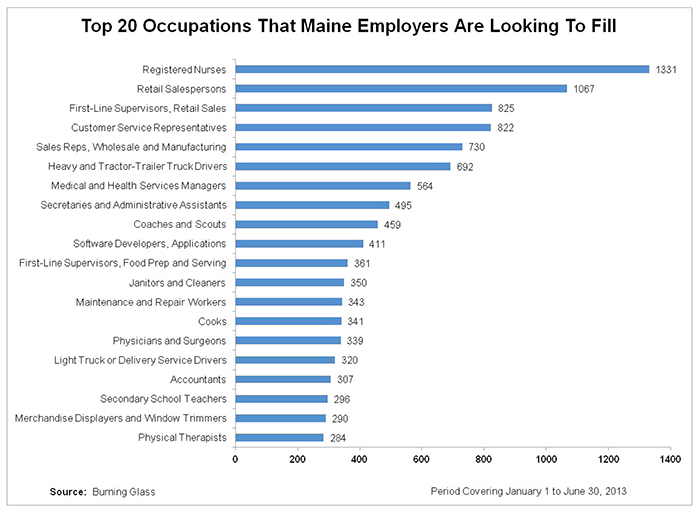Registered nurses and retail salespeople are the jobs most in demand in the state, according to a study released Wednesday by the Maine Development Foundation using recent online job postings.
The study was the first of what the organization says will be a regular report on job trends in the state.
The report, based on online job postings from January to June 2013, shows the top 20 occupations that Maine employers are hoping to hire for; the industries with the highest number of job postings; the skills, education and work experience associated with the jobs and recent employment and hiring activity in the state.
The listings in the report were culled from online social media sites such as Facebook and LinkedIn.
According to the report, the top job vacancy advertised online was for registered nurses, with 1,331 postings, followed by postings for retail salespeople. Hospitals were the type of employers with the most postings, followed by educational services.
“The occupations with the most job postings include a mix of higher wage, specialized positions and lower wage, less technical positions. Registered nurses top the list of the most advertised positions, followed by several categories related to retail sales, wholesale, and customer service,” the report said.
The report noted that “although the top occupations are not primarily the higher wage, more specialized positions, it is encouraging to see software developers, physicians, and accountants, for example, each with several hundred job postings in the first half of the year.”
A recent report by the Maine Sunday Telegram/Portland Press Herald looked at the Maine Jobs 2020 report, a comprehensive survey released every two years that analyzes more than 600 job categories in the state, and found that most of the jobs projected through the year 2020 do not require science, technology, engineering and math, also known as STEM, backgrounds.
Of the top 25 jobs that are expected to see the highest growth in actual new job openings, 18 don’t require more than a high school education, according to the Maine Jobs 2020 report, including wait staff, cashiers, maids, home health aides, janitors and warehouse workers, all of which pay around $12 an hour or less.
There are more than 50,000 unemployed Mainers and another 60,000 people who are considered “underemployed,” who have given up looking for jobs or who are working part time and want more hours than they can get.
The postings also indicated that employers were seeking workers proficient in so-called “soft skills,” which showed up most often in the postings, with communication and coordination, business environment skills and problem-solving as the top three most sought-after abilities.
Most of the posts indicated employers sought applicants with work backgrounds that included sales experience. Business administration and management was the top college degree sought in postings, followed by nursing, then computer science.
“There’s nothing shocking or surprising,” said Ed Cervone, president and chief executive officer of the Maine Development Foundation, a private nonprofit organization based in Augusta. Created in 1978, the foundation is a non-partisan membership organization that focuses on the the issues of productive work forces.
Jobs for Maine’s Graduates will “most definitely” use the report, said president and chief executive officer Craig Larrabee.
The private nonprofit organization has career and education mentoring programs in 62 high schools and middle schools in the state.
“We would make this report part of our curriculum offerings in our classrooms and share that with the students directly,” he said.
The report acknowledges a discrepancy between the number of online job postings and actual job vacancies in Maine, because of duplicate postings, single postings for multiple jobs and the fact that some job openings are not posted online.
Still, the report contends, tracking online job postings can show trends, demand for certain jobs, the types of employers advertising and the mismatch in experience, skills and education between those seeking jobs and the jobs that are posted.
The report “in and of itself doesn’t answer all of the questions,” Cervone said.
He said the report is meant to be analyzed alongside other data, such as projections from the Maine Department of Labor, that together “tells a bigger story.”
The Maine Development Foundation, whose mission is to create a productive work force to drive the growth of the state’s economy, purchased the data for its report from Burning Glass, a Boston-based firm that uses technology to match people with jobs.
Cervone said the foundation will seek feedback on whether to include more or other information in subsequent reports and on how often to publish them. He said the next report will probably come out in the fall.
Send questions/comments to the editors.




Comments are no longer available on this story